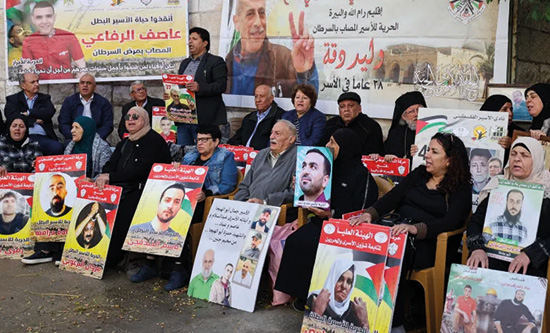
The machinery of repression that the Zionist state inflicts on the Palestinian people has always included arbitrary imprisonment. Alongside the massacre of Palestinians in Gaza since early October there has been a further increase in the already wide-scale detention of Palestinians in the occupied West Bank, with nearly 1,700 arrests between 7 and 31 October. As FRFI goes to press, the sustained resistance in Gaza has resulted in 39 Palestinian women and children prisoners being released, with an agreement for Israel to release up to 150 in total in exchange for 50 people captured in Israel.
As of 1 November, the total number of imprisoned Palestinians stood at 6,809, including 170 children. Around one-fifth of the male Palestinian population has at one time or another been imprisoned. Unlike Israeli citizens, Palestinian prisoners are tried in military, rather than civilian, courts.
Over 2,070 of these prisoners are held under Administrative Detention (AD) – a means for Israel to imprison Palestinians without charge or trial, and without even informing them of the reason for their imprisonment.
Administrative Detention was originally introduced in Palestine by the British occupation in 1938, after a popular uprising known as The Great Revolt. Since the 1948 Zionist state was founded, over a million Palestinians have been imprisoned. AD orders are issued for up to six months at a time and are indefinitely renewable, with Palestinians routinely jailed for years under these orders.
Palestinian prisoners endure appalling treatment. Human rights groups have documented various forms of physical and psychological abuse: arbitrary beatings, excessive use of solitary confinement, the denial of family visits and a lack of access to legal advice. The UN has concluded that in some cases this constitutes torture.
Children are not excluded from such treatment. Research published in July 2023 by Save the Children revealed that the majority of child prisoners experienced appalling levels of physical and emotional abuse, including being beaten (86%), threatened with harm (70%), hit with sticks or guns (60%), strip searched (69%), kept in solitary confinement for between one and 48 days (60%), deprived of access to healthcare (68%) and denied visits or communication with their families (58%).
The Zionist state uses prisons to liquidate and kill Palestinians but still the Palestinian prisoners fight back and their struggle is a core part of the wider struggle. On 17 August 2023, 1,000 political prisoners staged a hunger strike in protest against violent attacks by guards on prisoners in Negev prison. This act of solidarity across the system was successful and the regime conceded the prisoners’ demands.
In many ways, the prison experience and struggle of Palestinian activists in Israel mirrors that of Irish Republicans in the British occupied north of Ireland during the 1970s and 1980s. And, just as the struggle of the Irish political prisoners fuelled the wider anti-imperialist struggle in Republican communities, the courage of the Palestinian prisoners in resisting their inhumane treatment at the hands of the Zionist state continues to fuel the resistance of the wider Palestinian community.
John Bowden
FIGHT RACISM! FIGHT IMPERIALISM! 297 December 2023/January 2024




